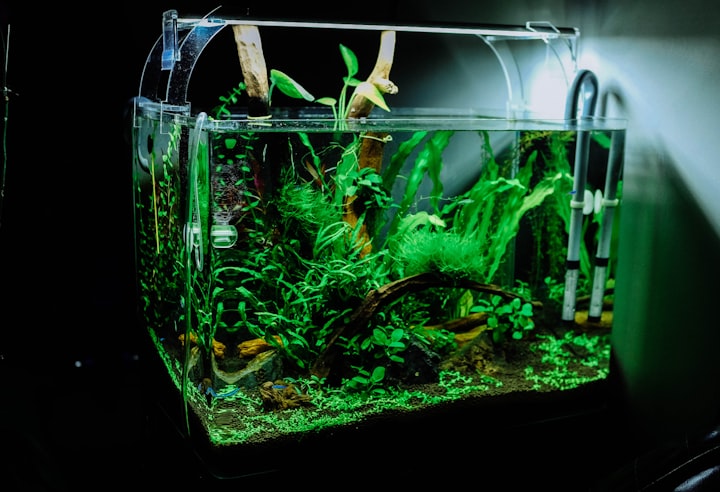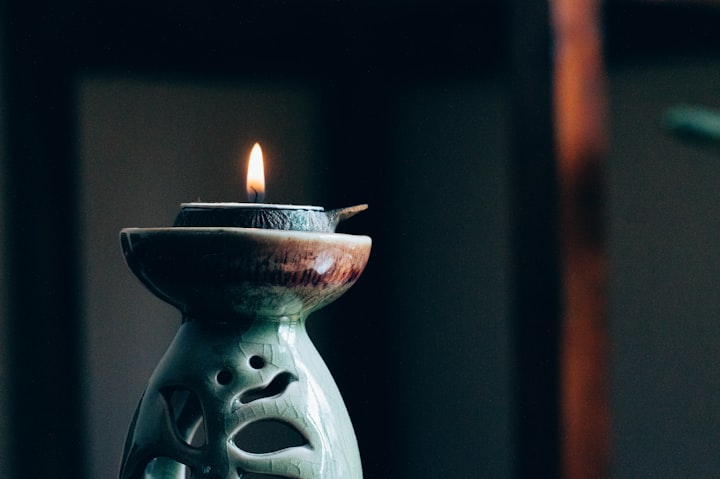Fishkeeping and Herpetoculture as Meditation
Cutting my way through stress and anxiety
I’ve lived parallel lives. Or maybe it’s that I constantly sense the alternate reality that runs parallel to ours. To mine. Until my last year of high school, I thought that I would be join the sciences. I thought that I would earn my own neon orange beanie and join the likes of Jacques Cousteau in oceanic expeditions. My sense for interior design revolved around National Geographic cut-outs plastered along my bedroom walls. I went to sleep to cassettes playing whale songs or wolf calls. But I also knew, even then, that the dream of becoming a legendary biologist or conservationist would be a hard one to achieve. As I matured, I turned my sights to going to veterinary school with the hopes of eventually working at a zoo. For half of my senior year, I was an intern at a veterinary practice that worked with both cats and dogs as well as farm animals. It was a dream come to life in a lot of ways. I enjoyed the hustle and bustle, the problem-solving. My first day I worked with a 150lbs sulcata tortoise with deep and infected lacerations in its neck from a fight for dominance with yet a larger tortoise. My second day was mostly spent assisting in the euthanasia of a family pet. Between what seemed to be hourly rituals of spaying and neutering dogs and cats, there were plenty of little dramas at play that kept my interest. Complications would arise. A rare disease would pop up. A traumatic break, a difficult surgery. Strange and exotic animals would come to be seen. Wild animals like raccoons and opossums would routinely turn up, but working with something like a wallaby or a spider monkey was always a fun surprise. All these years later, I still remember Slinky, a 15ft Burmese Python that was as sweet as could be even though he had come to us with a bit of a tummy ache. Even still, I began to get bored. As much as I loved the work I was doing, it felt that most of the job relied on rote memorization. A set of symptoms got a specific treatment and that was it. This sort of disillusionment coincided with my writing and research projects built into the internship. As I was writing papers about the nature of the veterinary profession as well as reflections of my own experiences, I came to realize that I really enjoyed that process more. The critical thinking involved became more rewarding than helping to perform up to 8 neuterings a day.
For better or for worse, I started and ended my college career as an English major. But my love for animals never left me. I took on a part-time job at a pet store to pay my way through college. My first year, I was a cashier. Between ringing up items, I would always look longingly across the store at the wall of fish tanks. I’d find ways to sneak over and take a look, ask questions. I began researching the animals there--the fish, but also the different reptiles, birds, and small mammals. It took an entire year, but I was eventually able to convince management to be promoted to work with the exotic animals. And, even though it was a simple and underpaid retail job, I took my work home with me. Besides writing up my research findings in the form of detailed husbandry guides for my coworkers, I eventually took the jump and started getting involved in the hobby directly. By the time I left my job 5 years later, I had a bearded dragon, three leopard geckos, one crested gecko, two Indonesian white-lined geckos, and four freshwater aquariums. The money I made at the pet store just went to buying supplies at the pet store. But, in a way, it felt that herpetoculture and aquaculture allowed me to live in a microcosmic version of the worlds I imagined when I read about Cousteau or watched documentaries with Steve Irwin and Jeff Corwin. In a very small way, I was a conservationist. For example, crested geckos almost went extinct until they were specimens were taken by biologists in the 1990s and, ultimately, ended up in the hands of experienced hobbyists. Thanks to these individuals, captive-bred animals were able to released into the wild to help bolster wild populations. Now, the crested gecko is only listed as “vulnerable” according to the IUCN, and it is now the second-most widely available gecko in the pet trade.
But as much as I loved the science behind these hobbies, I think the reason why I’ve kept with it so long has been for their meditative qualities. My aquariums were all planted tanks. They were ecosystems built around lush forests that I constantly kept to my aesthetic standards. Much like a zen master trimming a bonsai tree, I would take my scissors and carefully clip my plants back into shape. But each cut had to be carefully placed. An unsteady hand could mean injured root systems. Even with a steady hand, strategic decisions had to be made. For a lot of types of plants, each angle of a cut would then dictate the direction new growth would take. Haphazard cuts meant a haphazard jungle. However, I would sometimes decide to grow specific plants that grew quickly just so that I had something I could constantly shape and tweak. I would trim walls of Java Moss for a living background; I’d grow forest floors of Hemianthus callitrichoides and Glossostigma elatinoides and keep them short and tight. I essentially grew these plants so that I could guarantee I would be able to sate my new appetite for cutting things. I was obsessed with creating order from disorder. I came to understand why someone could build a career out of cutting hair.
But even the aquariums weren’t enough. I converted my reptile tanks to bioactive setups. Like the aquariums, they became self-sustaining ecosystems. Special attention was paid to the soil and lighting so that, of course, I could grow plants in the tanks. The bearded dragon and leopard geckos got arid landscapes with aloes, haworthias, jade plants, and various cacti. Since they’re ominvores, I began to grow carpets of oregano for my bearded dragon to have constant access to a salad bar--and for me to have something to constantly trim and shape. I had a lot more freedom with tropical tanks, though. Besides careful arrangements of vines and epiphyte “air” plants, I got to grow a variety of ferns, philodendrons, tradescantias, and types of pothos. Because the animals were constantly exploring their homes, the plants would take a beating. This, of course, meant weekly maintenance of the plants. Dead and damaged leaves were never given more than a day to exist within the tank. Plants were never given a chance to even get close to out-growing the confines of the tanks. Everything was kept orderly and beautiful.
My relationship with these hobbies have changed over time, usually against my will. Given moves across the country and the freak amount of natural disasters we’ve had in the past year, I don’t currently have any aquariums setup. Water doesn’t travel well. As a replacement, I got heavily into the houseplant scene, but even that was taken from me when the vast majority of my tropical plants couldn’t survive the freak freeze we suffered in February that left us without power for three days, making our home below freezing the entire time. I do what I can with what I have, but rebuilding my hobbies has fallen to the backburner. I miss it everyday, though. Besides the intellectual stimulation that came in working in scientific hobbies so different to my work as an English instructor, I benefitted even more from the moments of meditation. Each snip of the scissors brought me into and kept me within the present moment. I can trace the happiest phases of my life to the times when I had constant access to these moments. Now, I do my research and bide my time until I’ll be back in a space that will let me fully return to doing what I love.







Comments
There are no comments for this story
Be the first to respond and start the conversation.